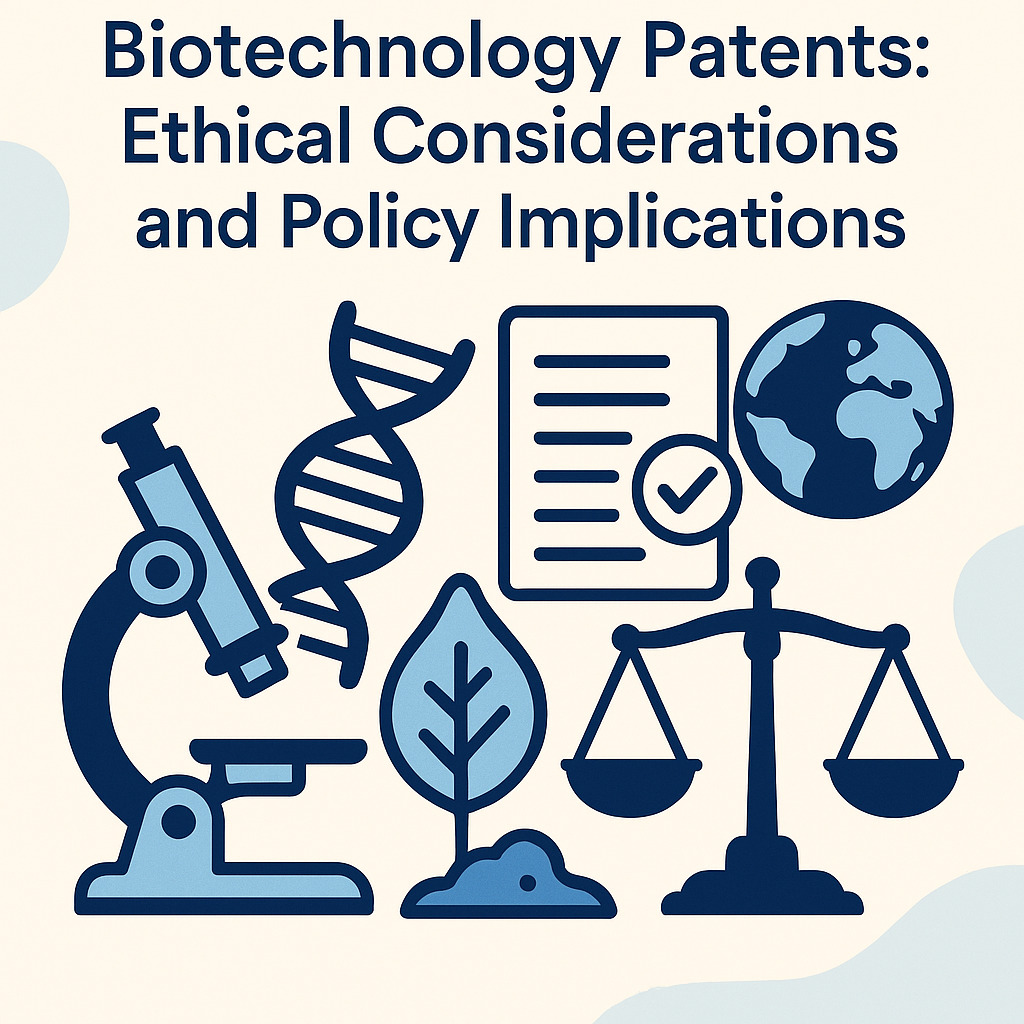View News
Biotechnology-Patents-Ethical-Considerations-and-Policy-Implications

Biotechnology Patents: Ethical Considerations and Policy Implications
Introduction
Biotechnology has revolutionized diverse sectors such as environmental science, agriculture, and healthcare. However, these scientific breakthroughs have posed significant challenges for legal frameworks, particularly patent law, which often struggles to keep pace with such rapid innovation. While patents are intended to foster innovation by granting exclusive rights to inventors, the patenting of biotechnological inventions raises complex ethical questions and policy dilemmas. Core concerns include equitable access to essential medical technologies, fair distribution of benefits derived from genetic resources, and the moral implications of patenting living organisms.
Patent Eligibility in Biotechnology
Under the WTO's TRIPS Agreement, member states are required to grant patent protection in all fields of technology, including biotechnology, provided that inventions are novel, involve an inventive step, and are industrially applicable. However, national implementations of these principles vary:
-
United States: In Diamond v. Chakrabarty (1980), the U.S. Supreme Court permitted the patenting of a genetically modified microorganism, setting a landmark precedent. Later, in Association for Molecular Pathology v. Myriad Genetics (2013), the Court clarified that complementary DNA (cDNA) is patentable, but naturally occurring gene sequences are not.
-
European Union: The European Patent Convention (EPC) allows gene sequences to be patented if their industrial application is disclosed. The EU Biotech Directive adds a layer of ethical scrutiny, excluding patents that offend public morality.
-
India: The Indian Patents Act, under Section 3(j), permits patents on microorganisms but explicitly excludes plants, animals, and essential biological processes from patent eligibility.
Ethical Concerns
-
Ownership of Life
A fundamental ethical issue lies in the idea of owning life forms. Granting patents over genes, cells, or organisms commodifies life, raising philosophical and moral objections about turning natural phenomena into intellectual property.
-
Access to Healthcare
Patents on life-saving drugs and diagnostics can create monopolies that restrict access, particularly in low- and middle-income countries. For instance, in the Myriad Genetics case, the exclusive patent on BRCA gene testing led to prohibitively high costs, limiting access to critical diagnostics for many.
-
Biopiracy and Informed Consent
Biopiracy refers to the unauthorized use of genetic resources, often sourced from indigenous communities, without proper consent or benefit-sharing. This practice undermines human rights and global justice, especially when commercial profits are not equitably shared with the source communities.
Policy Implications
-
Balancing Innovation and Public Welfare
Patent systems must carefully navigate the tension between incentivizing innovation and safeguarding public interest. Overly broad patents can stifle downstream research and restrict access to essential technologies. Governments and judicial bodies must evaluate the societal impact of granting exclusive rights over biological resources.
-
Compulsory Licensing
The TRIPS Agreement permits compulsory licensing in cases of public health emergencies, allowing governments to authorize the use of patented inventions without the patent holder’s consent. This mechanism plays a crucial role in ensuring access to vital medications.
-
Ethical and Social Licensing Models
Public research institutions and universities are increasingly expected to adopt ethical licensing models that prioritize affordability and accessibility, especially in the realm of global health. These models emphasize the social responsibilities of institutions engaged in biotech innovation.
-
Global Equity and Legal Infrastructure
Disparities in legal capacity and technological development across nations often result in unequal benefits from biotechnology. International instruments like the Nagoya Protocol on Access and Benefit-Sharing aim to ensure that developing countries with rich biodiversity receive fair compensation and recognition for their contributions.
Recommendations
-
Clarify Patentability Standards
Clearly defined criteria for biotechnological inventions can help prevent the overreach of patent protection and protect the commons of scientific knowledge.
-
Promote Open Innovation Models
Encouraging open science and collaborative research models can lower access barriers, especially during global crises such as pandemics.
-
Enhance Ethical Oversight
Patent offices should incorporate ethical assessments—particularly for inventions involving human genetic material or traditional knowledge—into the examination process.
-
Strengthen International Cooperation
A more harmonized global patent regime that respects cultural and legal differences can ensure fairness and equity in the global biotechnology landscape.
Conclusion
Biotechnology patents occupy a sensitive intersection of science, ethics, and law. While essential for driving innovation, unregulated or overly expansive patent rights—especially over genetic materials and living organisms—can undermine public health, ethical principles, and global equity. A balanced, transparent, and ethically grounded policy framework is imperative to ensure that the benefits of biotechnological advances are shared widely and justly, prioritizing collective welfare over narrow commercial interests.
Disclaimer: Every effort has been made to avoid errors or omissions in this material in spite of this, errors may creep in. Any mistake, error or discrepancy noted may be brought to our notice which shall be taken care of in the next edition In no event the author shall be liable for any direct indirect, special or incidental damage resulting from or arising out of or in connection with the use of this information Many sources have been considered including Newspapers, Journals, Bare Acts, Case Materials , Charted Secretary, Research Papers etc
-Prerna Yadav (LegalMantra.net Team)

